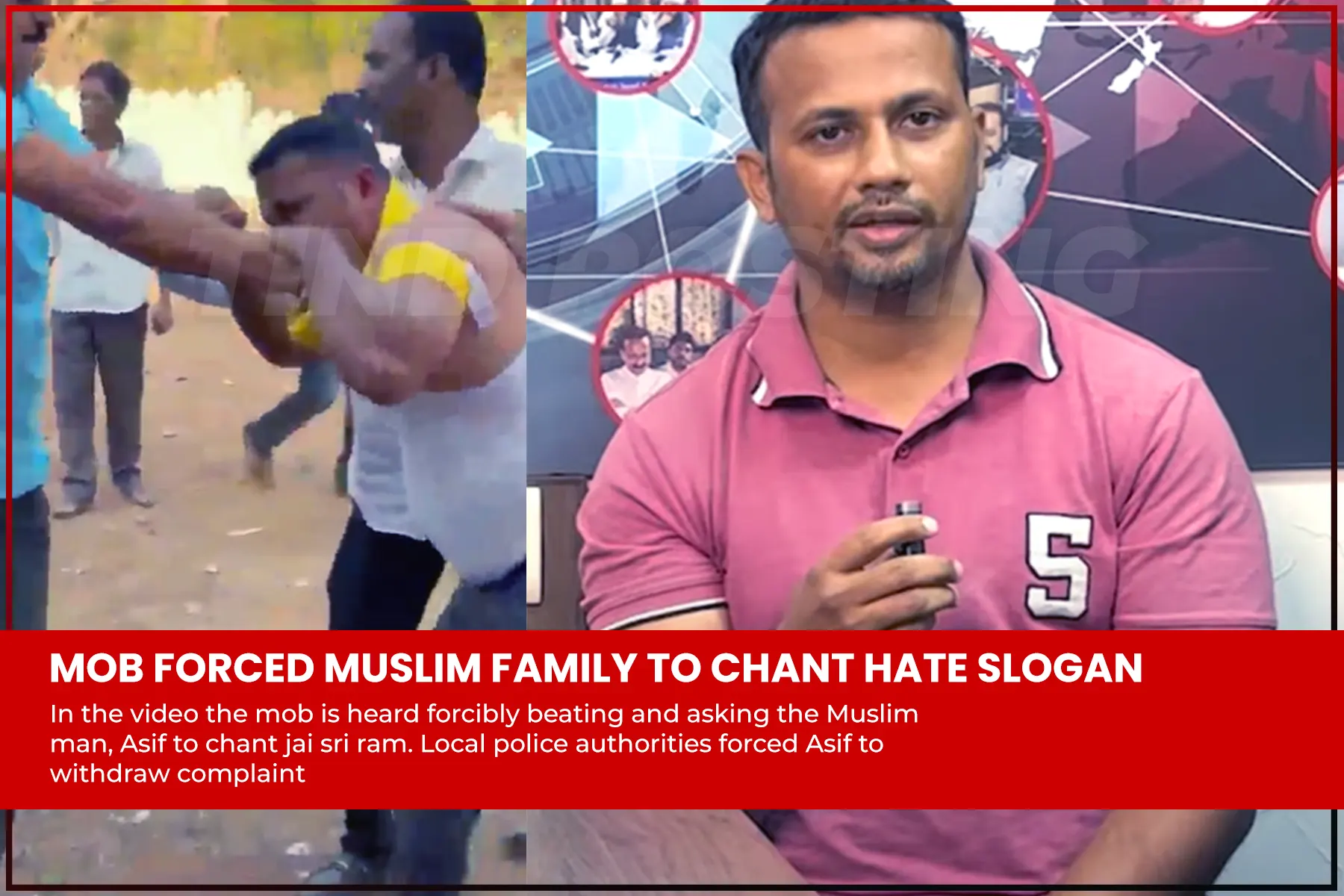


In a shocking incident, a Muslim woman was refused food at a charity stall near Tata Hospital in Mumbai for not chanting 'Jai Shri Ram'. The incident, which was recorded on camera, went viral on social media and sparked outrage among netizens. While some criticized the man and the NGO for their behavior, others questioned the meaning of Hinduism and the values it stands for. The second part of the video shows bystanders confirming the food distributor's statement, while a hospital staff member speaks out against such discriminatory rules.
Rising Tensions: Denial of Food to Muslim Woman at Charity Stall over 'Jai Shri Ram' Chant
In a disturbing incident, a Muslim woman in Mumbai was denied food at a charity stall near Tata Hospital for refusing to chant 'Jai Shri Ram.' The incident, captured on video, sparked widespread outrage and reignited debates about religious intolerance in India.
Background
The incident occurred on March 19, 2023, at a charity stall run by an NGO near Tata Hospital. The food distributor, identified as Ajay Rane, reportedly asked the woman to chant 'Jai Shri Ram,' a Hindu religious slogan, before providing her with food. The woman refused, citing her religious beliefs, and was subsequently denied food.
Outrage and Condemnation
The incident was widely condemned by netizens and social activists. Many criticized the man and the NGO for their discriminatory behavior, highlighting the violation of the woman's right to food and religious freedom. Some questioned the meaning of Hinduism and the values it stands for, while others urged the authorities to take action against those responsible.
Official Response
Following the viral video, the Maharashtra State Minorities Commission summoned Ajay Rane and the NGO to provide an explanation. Rane reportedly apologized for his actions and the NGO promised to take appropriate action to prevent such incidents in the future. The Mumbai Police also registered a case against Rane under the Hate Speech law.
FAQs
Q1: Why was the woman denied food? A1: The woman was denied food because she refused to chant 'Jai Shri Ram,' a Hindu religious slogan.
Q2: What legal implications could the man and the NGO face? A2: The man and the NGO could face charges under the Hate Speech law and other relevant provisions of law for discrimination and violation of religious freedom.
Q3: What is the significance of the 'Jai Shri Ram' chant? A3: 'Jai Shri Ram' is a religious slogan that has been used to promote Hinduism and Hindu nationalism in recent years.
Q4: Has there been a history of religious intolerance in India? A4: Yes, there have been several incidents of religious intolerance in India, including attacks on minority communities and the destruction of religious symbols.
Q5: What steps can be taken to promote religious tolerance? A5: To promote religious tolerance, it is important to educate people about the importance of respecting different faiths, promoting dialogue between different religious communities, and implementing laws that protect the rights of all citizens regardless of their religious beliefs.

JD Vance, the current US Vice President, publicly criticized Zohran Mamdani, a Democrat running for the position of New York City Mayor, for his recent comments about Islamophobia and 9/11. Vance argued that Mamdani's remarks failed to acknowledge the 3,000 individuals who lost their lives and those who were injured during the terrorist attack. Mamdani, who shared his aunt's experience of discrimination post-9/11, spoke at a mosque in the Bronx and highlighted the fear that many Muslims faced in the city.

In honor of World Polio Day, local restaurants in Minnesota are teaming up for the "End Polio Now" event to raise awareness and funds for polio eradication. From 7 a.m. to 7 p.m., residents are encouraged to dine at participating restaurants where volunteers will educate them on the impact of polio worldwide and how to help. The event's signature sponsor, Eagle Rock, along with other local restaurants, will donate proceeds to Rotary International, which uses funds to provide polio vaccines to children in vulnerable areas. This effort is crucial given that polio continues to be a problem in some parts of the world, even though it has been eliminated in the US since 1979.

In a tightly contested race for the Rajya Sabha seats in Jammu & Kashmir, the ruling NC alliance emerged victorious, securing three out of the four seats. The BJP, which held only 28 seats in the Assembly, had hoped for a win through cross-voting or support from smaller groups. However, the NC's dominant position in the 88-member Assembly reaffirmed voter trust in their post-Article 370 political stability. PDP President Mehbooba Mufti also congratulated the NC candidates and expressed hope that they will strongly represent the people of Jammu & Kashmir in Parliament.

Mayor Derek Slaughter has vetoed a recent city ordinance that limits the terms of elected officials, citing concerns about retroactivity and lack of language addressing current officials. This veto comes after the ordinance was adopted in a 6-0 vote by City Council, with the mayor absent. If legally challenged, the defense of this ordinance could result in unnecessary costs for taxpayers. The mayor's decision has sparked a response from council members, with attempts to reach them for comment.

Prime Minister Narendra Modi addressed his first election rally in Bihar and expressed confidence in winning the upcoming polls. He mocked the opposition INDIA bloc and praised the unity within NDA, highlighting leaders like Nitish Kumar, Chirag Paswan, Jitan Ram Manjhi, and Upendra Kushwaha. Modi also criticized the 'jungle raj' under RJD and Congress and highlighted Bihar's progress under Nitish Kumar's tenure. Despite the upcoming Chhath festival, the PM thanked the crowd for attending and described the recent GST rate revision as a 'festival of savings'.

The suspension of Praveen Kumar K P, a PDO serving in Sirwar taluk of Raichur district, for participating in an RSS rally has sparked controversy in Karnataka. BJP leaders have condemned the move and promised to fight it legally, claiming that the officer's right to participate in such events is protected by law. Meanwhile, the state's Rural Development Minister has written to the Chief Minister for a ban on RSS activities on government premises, further intensifying the issue.

In a heated verbal exchange, Maratha quota activist Manoj Jarange Patil accused NCP Minister Chhagan Bhujbal of attempting to create a rift between the OBC and Maratha communities for political gain. During a recent OBC rally in Beed, Bhujbal and Dhananjay Munde attacked Jarange, with Pankaja Munde, a BJP OBC leader, watching from the sidelines. Jarange also praised Chief Minister Devendra Fadnavis and Minister Pankaja Munde for staying away from the rally and emphasized the unity of the OBC community. Bhujbal, on the other hand, warned Jarange against challenging the community's rights and vowed to stand up against any attempts to divide them.

On the auspicious occasion of Bhai Dooj, Madhya Pradesh Chief Minister Mohan Yadav transferred a total of 44,900 crore directly into the bank accounts of 1.27 crore women beneficiaries under the Ladli Bahna Yojana. This initiative aims to support and empower women in the state, with each eligible woman set to receive 1,500 per month from November onwards. During the special program at the Chief Minister's residence, Yadav extended his wishes for a happy Bhai Dooj, emphasizing the importance of the brother-sister relationship and the government's commitment towards ensuring the safety and well-being of Ladli Bahnas in the state.

Union Home Minister Amit Shah celebrated the Gujarati New Year and his 62nd birthday in his hometown of Ahmedabad, surrounded by senior political leaders, party members, and well-wishers. Shah's rise in public life through the RSS and his partnership with Prime Minister Narendra Modi have shaped Gujarat's and India's political narrative. His sharp organisational mind, efficient approach, and booth-level political management have been key in building the "Gujarat model" that gave the BJP an enduring edge. Despite transitioning to national politics, Shah's political heart still beats in Ahmedabad, as evident in his New Year celebrations and plans to meet the newly appointed ministers of the Gujarat cabinet.

In a recent incident at the Vasai Fort in Maharashtra, a man dressed as Chhatrapati Shivaji Maharaj got into a heated argument with a security guard over language. The man, who was recording a video, berated the guard for not speaking Marathi and disrespecting the legacy of Shivaji Maharaj. Social media users were divided in their opinions, with some criticizing the man's behavior while others felt the guard needed to be taught a lesson.